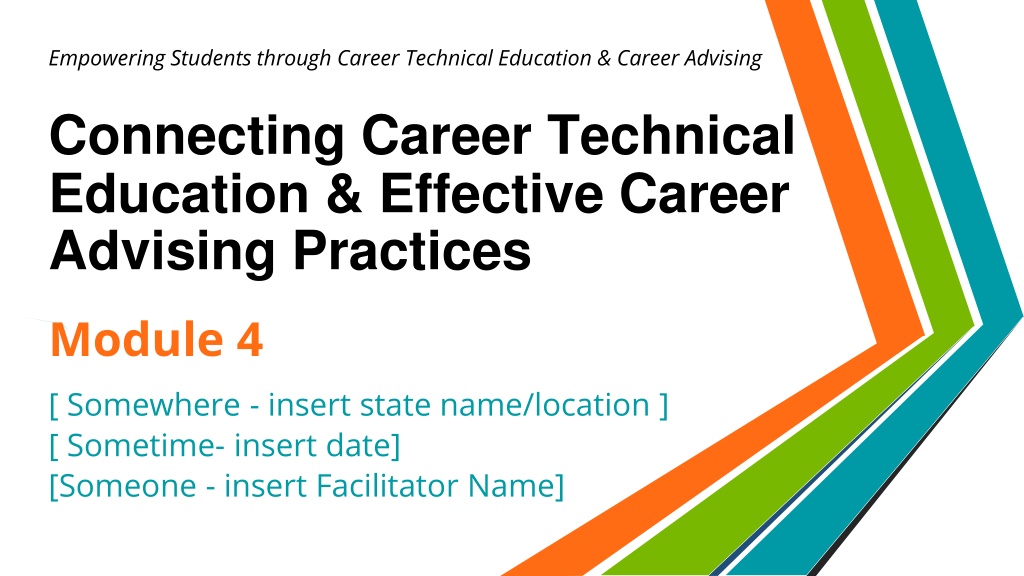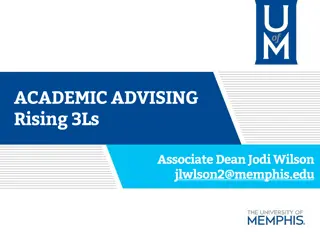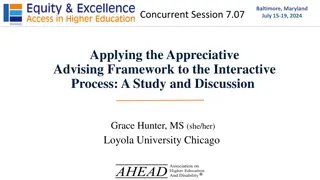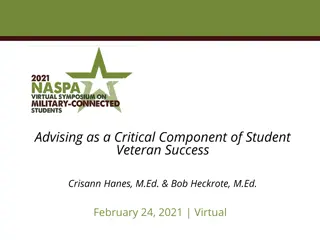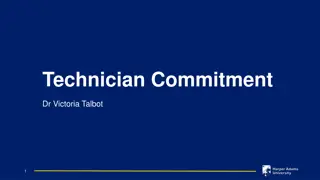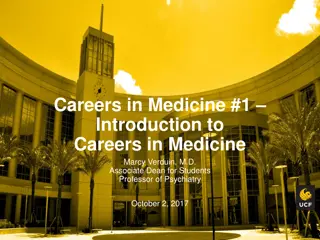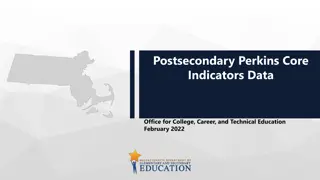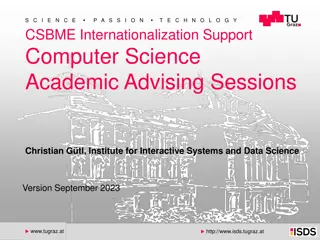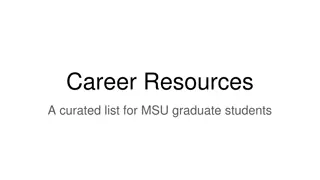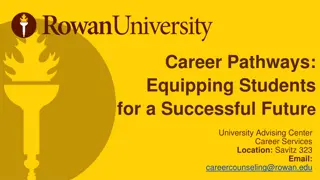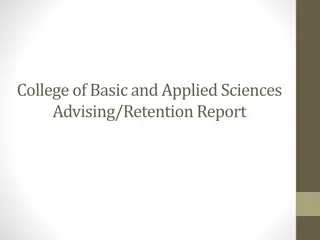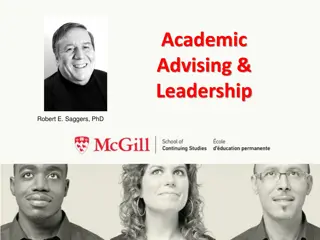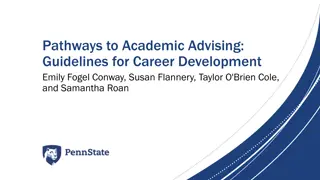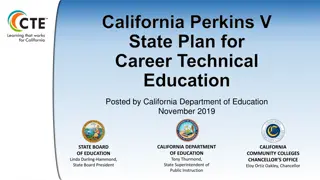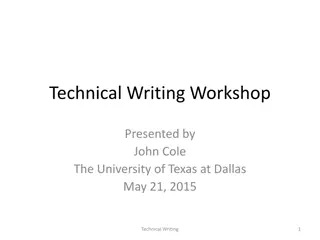Empowering Students Through Career Technical Education & Career Advising
This module focuses on empowering students through effective career advising strategies, resources, and processes to explore future career options. It highlights the importance of Individual Learning Plans (ILPs) in career advising, fostering a mindset that prioritizes student interests, and creating a seamless career development continuum from elementary to postsecondary education. The session aims to equip participants with the tools to guide students towards successful career exploration and preparation for the labor market.
- Career Education
- Student Empowerment
- Career Advising
- Individual Learning Plans
- Postsecondary Transition
Download Presentation

Please find below an Image/Link to download the presentation.
The content on the website is provided AS IS for your information and personal use only. It may not be sold, licensed, or shared on other websites without obtaining consent from the author. Download presentation by click this link. If you encounter any issues during the download, it is possible that the publisher has removed the file from their server.
E N D
Presentation Transcript
Empowering Students through Career Technical Education & Career Advising Connecting Career Technical Education & Effective Career Advising Practices Module 4 [ Somewhere - insert state name/location ] [ Sometime- insert date] [Someone - insert Facilitator Name]
Pre-Workshop Survey [Insert link or QR code here]
Community Agreements (see module worksheet)
Introductions In the spirit of career development and future planning, finish this sentence in chat: When I was a young person, I aspired to become
Learning Objectives Gain knowledge on effective career advising strategies, resources and processes to empower students to explore future career options, and evaluate against current work; Increase familiarity with Individual Learning Plans (ILPs), their value to career advising and navigation for students and various implementation models at scale at the local and state level Develop a mindset that reflects the thinking that a successful career advising and development system must respond to students interests and provide career awareness and exploration for each student not just those enrolled in CTE. Help foster a seamless career advising and development continuum from elementary through postsecondary; including wraparound services, accelerated learning strategies, guided pathways and connections with local employers to ensure smooth transitions into the labor market.
Speakers Explore more by visiting: https://careertech.org/without-limits
School Counselors Top Source for Information 67% - #1 Learners 76% - #1 Parent/Guardian
Our Role Personal interests/aspirations/aptitudes + Competencies/Skills + Being informed on where/what = CTE Champion! 11
MYTH FACT Fact Myth Only non-college-bound students take CTE classes. CTE provides a seamless pathway to postsecondary education. Nearly every state reports higher graduation rates for CTE concentrators compared to all students 72% of CTE concentrators enroll in postsecondary education full time immediately after graduating CTE students have many opportunities to earn college credit in high school through dual and concurrent enrollment http://s3.amazonaws.com/PCRN/docs/NACTE_FinalReport2014.pdf
MYTH FACT Myth Fact CTE is jobs training CTE empowers learners to explore multiple career options CTE programs of study start broad before providing career pathway-specific knowledge and skills CTE provides hands-on training, mentoring and internships to expand professional networks 85% of CTE families are satisfied with their ability/their students ability to explore careers compared to 54% of families not in CTE. https://cte.careertech.org/sites/default/files/AdvanceCTE_CommResearchReport_042721.pdf
Discussion #1 Why is providing career information to students and families important? How should it be used to inform student exploration and planning? What strategies are you currently using to provide career information and planning support?
The State of Career Technical Education: Career Advising and Development Need for information on effective state-and school- level strategies for career advising and development Advance CTE partnered with ASCA to conduct survey research Responses from 45 State CTE Directors, 10 state school counseling directors and 647 school counselors School counselors from all 50 states and District of Columbia, as well as all grade levels
Report Findings There was a major disconnect in state and local responses Few states believe their systems are fully aligned throughout K-12 Career advising and development efforts are much more common at the high school level Effectiveness of strategies is a mixed bag 16
Report Findings (contd) 58 percent of states rate their state systems as only somewhat effective in their career advising and development efforts. Most frequently used strategy is conducting inventories with students to identify their interests, skills and abilities The most effective strategies are not the most used. 17
Most Effective/Least Used Connecting students with CTE coursework and career pathways as a career advising and development strategy Providing or facilitating work-based learning experiences for students Engaging and partnering with industry and community 18
What Resources Do You Use to Support Career Development Efforts?
What Barriers Do You Face in Providing Effective Career Development Services?
Recommendations Provide more effective professional development and resources to school counselors Ensure that career advising and development is a school- and community-wide effort Explore partnerships between secondary and postsecondary systems and institutions to both gather more data on existing strategies and implement new strategies as appropriate Examine and improve current career advising and development strategies so that they are all part of one broad, cohesive strategy 21
Discussion 2 Which of these recommendations would be of value to your school/community and would help address potential gaps in your local career development system?
Key Recommendation Improve the effectiveness of Individual Learning Plans (or equivalent) by: Scaling up innovative practices, including having students begin them in middle school, and Working with school counselors to ensure that Individual Learning Plans are integrated into a broader career development process
Individual Learning Plans (ILP) as a Career Advising Tool Academic and career planning tool Known by Individual Career and Academic Plan (ICAP) and other terms Used in 38 states, but mandated for all students in only 21 states (U.S. Department of Labor) Varied effectiveness Disconnect between state and local levels Value in beginning plans in middle school Need to engage parents, guardians and teachers
Individual Learning Plans (ILP) as an Effective Career Advising Tool ILP s can be used more effectively by: Beginning them in middle school Including them as part of a wider conversation and process Being clear and strategic about connections to career pathways and CTE opportunities
Resource: Implementing Individual Learning Plans http://www.ncwd-youth.info/wp-content/uploads/2018/03/Promoting-Quality-ILPs-Throughout-the- Lifespan-WEB.pdf
Coalition for Career Development National Interactive Map on Career Readiness Components
State Placeholder [Placeholder to add state/local information on how ILPs/ICAPs are administered in your state/local level]
Key Points Completing a meaningful ICAP process helps learners connect the relevance of education with their career and life goals and select a postsecondary pathway and create academic course plans that support their goals. When learners are exposed to career pathways, work- based learning and early college experiences through the ICAP process, they are able to think more deeply about their goals earlier and may be more inclined to choose career pathways.
Key Points ICAPs provide the opportunity for learners to have meaningful conversations and develop relationships with supportive adults, making ICAPs a critical tool to ensure equity in the career development process Developing a culture of career readiness is necessary to ensure a district and school-wide approach to implementing ICAPs.
Discussion 3 When reflecting on ILPs in action: What does a Career-Focused Classroom look like?
State and Local Models Kansas Massachusetts state and local (Boston) Iowa Colorado
Kansas Model: Career Development Process
Kansas ILPs https://www.ksde.org/Agency/Division-of-Learning- Services/Career-Standards-and-Assessment- Services/Content-Area-F-L/Individual-Plans-of-Study- IPS-Student
Kansas ILPs https://www.ksde.org/Agency/Division -of-Learning-Services/Career- Standards-and-Assessment- Services/Content-Area-F-L/Individual- Plans-of-Study-IPS-Student
Massachusetts: College, Career and Civic Ready (CCR) Who Am I? Personal/Social Domain Where Am I Going? Career Development How Do I Get There? Academic and Postsecondary Planning (MyCAP) Workplace Readiness Academic Learning Knowledge, Skills, and Experiences for College and Career Readiness, & Civic Preparation Personal/Social Development
MyCAP Process: CCR Scope and Sequence DOMAINS Learning Objectives Artifacts/ Assessments Lesson Plans/ Activities Three domains identified in the CCR definition Personal/ Social Each domain is developed for students at every grade level: Learning Objectives that describe what students should know and be able to do MyCAP Artifacts will document the learning/skill development, activities, reflections, etc. Unit Lessons, Strategies and/or Activities Career Development Academic, Career and Postsecondary Planning
Creating a MyCAP System 1. MyCAP team: at least 4-6 from multiple roles: counselor, gen ed teacher, sped/EL teacher, CTE teacher, administrator, etc. 2. Map CCR Landscape: what do we have, where are there gaps? 3. Identify Learning Objectives: each domain, every grade 4. collected, presented, or assessed to demonstrate achievement of learning objectives? 5. Create Lessons: where will they happen, who is leading, what are the key activities 6. Create an implementation plan and gain buy in Artifact(s): What will be
Iowa - Individual Career and Academic Plans Five Essential Components the ICAP must cover: (IA Code 281-49.4(1-5)) Self-Understanding Career Information Career Exploration Postsecondary Exploration Career and Postsecondary Decision
Iowa - Individual Career and Academic Plans ICAP = Action Verb = One is always ICAP-ing = One is never done being ICAP-ed Continue to create holistic and authentic opportunities for students and faculty/staff. *borrowed concept/model from Colorado ICAP: Individual Career and Academic Plan (ICAP) | CDE (state.co.us)
Colorado Model: Meaningful Career Conversations http://www.cde.state.co.us/postsecondary/pwrplaybookmeaningfulcareerconversations
Colorado: Meaningful Career Conversations https://www.schoolcounselor.o rg/Publications- Research/Publications/Free- ASCA-Resources/Career- Conversation-Starters
Activity 1: Worksheet Page 4 Identify one strategy that you are currently using for career advising/development. What would you love to have in place but isn t there yet? What is your stretch goal ? How can you help students make connections between their schoolwork and career fields?
Learning That Works Resource Center https://www.careertech.org/resource-center Handout Hub 48
Post-Workshop Survey & Collective Commitment (add link or QR code)
Thank You! Congratulations on beginning to become a CTE Champion! Insert contact info here: Insert local resource links here: Insert next steps or other last thoughts here: Insert CEU option here:
